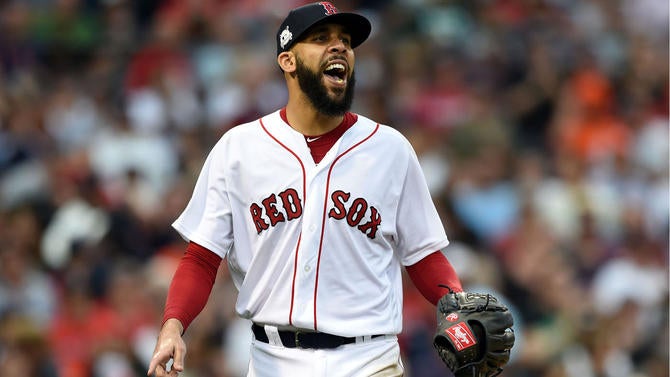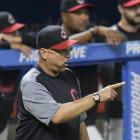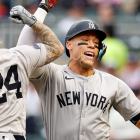The big story of the 2017 MLB playoffs so far is the mysterious awfulness of starting pitchers.
The Yankees opened their postseason by having fireballing right-hander Luis Severino get pounded for three runs in one-third of an inning, threatening to effectively end their season just minutes into their postseason. No worries, though: Four batters into the bottom of the first inning of the AL Wild Card Game, the Yankees had tied the score at 3, after Didi Gregorius smashed an Ervin Santana wounded duck of a pitch into the bleachers.
Then in the ALDS, New York threatened to tie the series in Game 2, demolishing Cleveland's starter for six runs on seven hits in 2 2/3 innings. Cleveland did come back to win the game, but everyone in attendance couldn't quite grasp how the Yankees had so thoroughly crushed that starter -- Corey Kluber, the AL Cy Young favorite who led the league in wins, complete games, shutouts, ERA, park-adjusted ERA, hit rate, and strikeout-to-walk rate. Coming into that start, Kluber had closed out the regular season by posting the following line over his final 12 starts: 89 innings, 54 hits, 104 strikeouts, nine walks, and a 1.42 ERA.
The Red Sox-Astros series has offered another striking example of mysteriously awful starting pitching. In Game 1, the Astros clobbered Boston's starter for two runs in the first, and went on to score seven (on nine hits) off him in five innings. That starter? Chris Sale, the overpowering lefty who became the first AL pitcher since Pedro Martinez to strike out 300 batters in a season, and the only pitcher better than Kluber this season, per Fangraphs Wins Above Replacement. In Game 2, Houston chased Drew Pomeranz from the game after two innings, after scoring four runs on five hits (including two in the first inning). In Game 3, the Astros exploded for three runs in the first inning, knocking Doug Fister out in the second after he managed to retire just four batters. Except the Astros didn't win this time, because the Red Sox lit up Houston starter Brad Peacock for three runs on six hits over 2 2/3 innings, en route to a 10-3 win in an elimination game.
All told, the numbers are ugly. Even with Masahiro Tanaka and Carlos Carrasco giving us the first real pitchers' duel of the postseason on Sunday night, starting pitchers this October have posted a collective 5.68 ERA. On the flip side, while relief pitchers haven't been perfect by any means, they've still delivered a much tidier ERA of 4.39. Counting Sunday's games, a jaw-dropping 26 runs have crossed the plate in the first inning, in a span of 12 games.
Last October felt like the beginning of a sea change for playoff pitcher usage. The dominance of Cleveland left-hander Andrew Miller didn't merely remind us of the importance of strong bullpens in the postseason. Rather, it was manager Terry Francona's willingness to use Miller in all kinds of different spots -- even in the earlier innings of games -- that seemed to signal a shift away from the model that had dominated baseball for years: Save your best relievers for the late innings, ignoring the risk of games getting out of hand early when you bring in glorified mop-up men to clean up starters' messes.

We've seen more teams adopt the Miller model this year, first in the regular season and then far more aggressively in the postseason. David Price returned from the disabled list on September 17, following his second extended disabled-list stint of the season. Rather than return to his old starter's role, Price became a multi-inning weapon for the Sox in relief. In five appearances, he hurled a total of 8 2/3 innings, striking out 13 batters, allowing just five baserunners, and giving up zero runs. He's offered more of the same in the playoffs. He entered Game 2 in the third inning, after the Astros punished Pomeranz and wild reliever Carson Smith, tossing 2 2/3 scoreless innings. He fared even better in Game 3, coming in to start the fourth and silencing Houston's bats with four scoreless innings that included four strikeouts and 57 dominant pitches.
There are extenuating circumstances in play here, to be sure. First, Price's scragged elbow all but forced the Sox to turn their $217 million would-be starting ace into a pitcher best deployed in smaller doses. Second, plenty of quality relievers have struggled in the early going of these high-scoring playoffs, from established bullpen hands like 2017 Astros All-Star Chris Devenski (three runs allowed and zero outs recorded in Game 3 against Boston) to other starters-turned-relievers-for-the-playoffs like Houston's Lance McCullers (who looked great at times but also gave up two runs and five baserunners over three innings ahead of Devenski).
The bigger takeaway is that it might be time for teams to start considering bullpening as the best approach to pitching in October. It's tempting to think back to Kluber's terrific performance last October, or Madison Bumgarner's magical 2014 postseason, and yearn for that one big horse who can power a team through the playoffs. But we've seen too much evidence of even elite starters getting rocked in postseason games to wonder if we're doing things wrong.
A bullpening strategy proposes that a great reliever, and not a starter, take the ball in the first inning. The reasons for this approach are manifold. First, relievers have been trained and conditioned to go all out from the moment they throw their first pitch on any given night, knowing they're only going to be in there for a short time and thus not needing to conserve energy for later innings. That means they don't have to hold back on velocity, or get overly cute about pitch sequencing because they might need to fool the same batter two more times that night. Start a game with a Kenley Jansen or Cody Allen and you know you're getting an inning or two of pure hellfire, right away.
That's an especially good thing to have when you're facing the top, most dangerous part of the order, something you're only guaranteed to do once per game -- in the first inning. Moreover, by going with a reliever from the jump, you're often forcing opposing managers into platoon disadvantages early on. Start a game with your righty closer, then bring in your excellent lefty starter in the second or third, and you could have a slew of mismatches working to your advantage; that or the opposing skipper starts burning his best bench bats early in the game to combat that handedness problem, another potentially positive outcome for the team on defense. The copious days off that October baseball offers means you can conceivably get multiple quality innings from relievers too, knowing they're fully rested and ready.
Even with teams' bullpens tossing more and more innings every season and relievers thus taking on a more important role in today's game, there's still a pecking order among pitching staffs when it comes to talent. Eric Gagne was an injury-prone flamethrower who lacked the longevity and durability to go deep into games ... so the Dodgers turned him into an MVP-winning closer instead. Aroldis Chapman came out of Cuba as a tantalizing young starting pitcher ... but the Reds saw a pitcher who could perform much better if he got to unleash his 102-mph fastball in short bursts, without worrying about what might happen six or seven innings into his evening. Mariano Rivera was a promising starting pitching prospect who also had a limited pitch repertoire ... he became a future Hall of Famer when the Yankees bumped him to the pen. David Price may well go back to being a top starting pitcher next season ... but these kinds of splits are pretty damn hard to ignore:
David Price in Postseason:
— Katie Sharp (@ktsharp) October 8, 2017
As Starter: 0-8, 5.74 ERA
As Reliever: 2-0, 2.35 ERA
Time after time, year after year, we see former starting pitchers flourish in bullpen roles, because it's much easier to breathe fire and crush planets when you're only needed for 10 or 20 or 30 pitches, instead of 100. Turn entire playoff games into shorter stints -- closers pitching in the first followed by most-of-the-time starters being deployed as two-, three-, or four-inning terrors -- and you unleash the full power of pitchers not holding back, not saving anything for later.
So yes, it's great to see a pitcher like Price bail out a beleaguered starter and lead his team to victory in a must-win game. What would be even better would be for a force of nature like Craig Kimbrel -- and not a scrap heap find like Doug Fister -- to start the game in the first place. More and more, pitchers are warming to the idea of abolishing traditional roles during the playoffs, on the theory that winning is more important than tradition. The first team to go all the way with this approach might be the team that goes all the way to a World Series title, too.
Thanks to Sean O'Rourke of Baseball Prospectus for providing research help with this article.






















